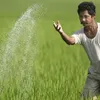Walmart Foundation invests $15M of its $25M grant to help Indian farmers
The Walmart Foundation has now invested more than $15 million of a $25 million commitment to improve farmer livelihoods in India. The grants will allow nonprofits Tanager and PRADAN to scale their efforts and help farmers earn more from the improved output and fair market access.
Foundation has announced two new grants as it aims to invest $25 million (Rs 180 crore) in India by 2025. This fund will be used to improve agriculture practices in India and help farmers scale their business for a sustainable livelihood.
The $25 million includes new funding of $4.5 million, which will allow non-profits Tanager and PRADAN to help farmers with the improved output and fair market access. It will also provide aid to women farmers through farmer producer organisations (FPOs).
The two new grants are part of a commitment made in September 2018 to invest $25 million over five years to improve farmer livelihoods.
So far, the Walmart Foundation has invested a total of $15 million of this $25 million with eight non-government organisations (NGOs) that work with more than 140,000 farmers, including nearly 80,000 women farmers.

Walmart Foundation is helping Indian agriculture
Kathleen McLaughlin, President of Walmart Foundation and Executive Vice President and Chief Sustainability Officer of Walmart Inc., said,
“The global COVID-19 pandemic has increased pressure on India’s farmers, especially women farmers shouldering extra responsibilities in the household while seeing their incomes diminish overnight. ”
The foundation, through its NGOs, will work with FPOs to develop knowledge of sustainable farming practices, share business best practices, add value to primary agricultural commodities, and improve access to finance and markets.
Kalyan Krishnamurthy, Group CEO and a member of Walmart Foundation Board of Directors, said:
“There is huge potential for innovative technology solutions to help farmers in India improve productivity and yield Farmer Market Readiness Programme, access valuable market information, and succeed as part of a more efficient and transparent supply chain. FPOs are key to the Foundation’s strategy for empowering farmers and bringing them into the digital era.”
NGO Tanager will receive over $2.6 million to scale its Farmer Market Readiness Programme and help farmers in Andhra Pradesh. The NGO will work with 13 FPOs to help 5,600 women farmers increase their productivity and profitability.
Phase one of Tanager's programme has equipped 17,500 farmers to increase their yields. This has resulted in sales of over 8,500 metric tons of produce worth roughly $3 million (Rs 22 crore).
“Phase Two of the programme, while expanding to include new crops and streams of income, also provides support to farming families during COVID-19. Our ultimate aim is to develop FPOs into sustainable businesses that can thrive beyond the life of the project,” said Amit Kumar Singh, Tanager Team Lead, India.
The additional grants will also go to Professional Assistance for Development Action (PRADHAN), which will use it to launch its Livelihood Enhancement through Market Access and Women Empowerment (LEAP) programme in West Bengal, Odisha, and Jharkhand in eastern India. LEAP will focus on supporting women to work together in FPOs to adopt new farming practices, diversify and intensify their output, and embark on profitable farming-related businesses.
The programme will reach out to 45,000 women farmers directly, benefiting a population of about 225,000 people.
(Edited by Teja Lele Desai)








